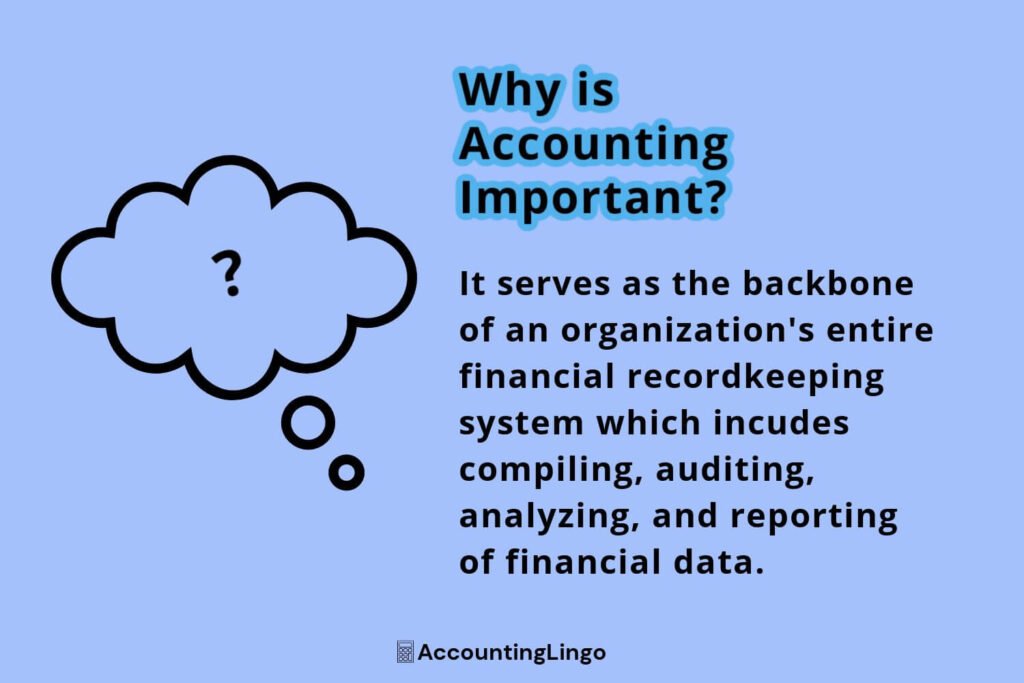
Why is Accounting Important?
Accounting is important because it serves as the backbone of an organization’s entire financial recordkeeping system which includes compiling, auditing, analyzing, and reporting of financial data.
Furthermore, it is a necessary field for all organizations and provides many benefits including:
Recordkeeping System
Recordkeeping allows for a standardized process of tracking all incoming and outgoing transactions. Organizations can easily access current and past transactional activity. A clear process helps ensure consistency and accuracy of organizational records when tracking assets and liabilities.
Legal Compliance
Following standardized accounting principles and frameworks ensures the recordkeeping process aligns with legal requirements. Accurately reporting and tracking financial information helps organizations avoid legal penalties. Equally important, a standardized process helps ensure timely payment of local, state, and federal income tax.
Communicates Financial Results
Accounting allows a formal process of publishing financial data which is then analyzed by creditors, investors, lenders, and other market participants. An investor could utilize this information to buy or sell stock while a lender may use it when determining whether to issue a loan.
Provides for Decision Making
Management utilizes internal accounting data to better understand their business. Internal reporting therefore allows them to make more informed business decisions. In addition, adding employees, acquiring a warehouse, or changing a vendor are potential decisions management may deploy after reviewing internal financial reports.
Helps Ensure Liquidity
Proper cash management helps ensure organizations can cover ongoing liabilities with cash and other liquid assets. Accounting therefore helps organizations determine their liquidity needs and effectively allocate resources to avoid bottlenecks and business disruptions. Mismanagement of liquidity can cause several issues including an increased risk of bankruptcy.
Understanding Accounting
Accounting involves all financial aspects of a business. Collecting, organizing, and reporting data in a straightforward understandable manner is a large part of the accounting process and therefore ensures organizations produce financial statements that reliably portray the current financial state of a business.
The most widely used financial statements include:
- Income Statement
- Balance Sheet
- Cash Flow Statement
- Statement of Retained Earnings
Creditors, investors, lenders, and other interested third parties use this financial data for many reasons including:
- Comparing costs in relation to revenues
- Identifying strengths and weaknesses
- Reviewing business results against competitors
Types of Accounting
Accounting is broken down into two areas of focus which include:
- Financial
- Managerial

Financial Accounting
Financial Accounting utilizes a framework and rules-based process to ensure recordkeeping accurately reflects the past and present state of a business. In addition, various frameworks outline the data collection and reporting process which help build confidence within the financial community.
When issuing financial statements outside publicly owned companies, a major accounting framework is required to be utilized. International Financial Reporting Standards (IFRS) is the most widely accepted framework throughout the world.
Countries like the United States have adopted their own reporting standard known as Generally Accepted Accounting Principles (GAAP).
Managerial Accounting
Managerial Accounting utilizes compiled data from financial accounting for a variety of internal purposes. Financial statements issued internally within a business are not required to follow any specific framework. Therefore, a business can choose to follow its own preferred format which can vary. Accrual or cost accounting methods may be used or a combination of both.
Management utilizes internal reporting to make important business decisions. Therefore, internal reports are generally formatted based on management’s preferences. Report variety can be extensive surrounding topics such as forecasting, analysis, and budgeted cost.
Accounting Careers
The accounting field is in demand, continues to grow annually, and pays a higher than average wage according to the United States Bureau of Labor Statistics. Accountants are primarily responsible for compiling, auditing, and analyzing financial data. In addition, a professional designation many industry participants obtain within the United States is referred to as Certified Public Accountant (CPA).
Some accountants set up their own practice while others seek outside employment. Common areas of focus within the field include tax planning, audit, and bookkeeping.
Roles often sought include:
- Accountant
- Auditor
- Financial Analyst
- Controller
- Chief Financial Officer
Where Accountants Work
Accountants have many employment options depending on experience and skill level. A bachelor’s degree is required for most entry level work while an advanced degree is required for higher-level roles. The Certified Public Accountant (CPA) designation within the United States along with similar designations in other countries is a common employment requirement.
Accounting Firms
Accounting firms may engage within many different industries, offering variety to their employees.
Additional services a firm may offer include:
- Personal or business tax preparation
- Preparing or maintaining accounts
- Auditing financial records
Engaging within a variety of industries helps an accountant decide which they wish to specialize in, unless a diverse client portfolio is preferred.
Governmental Agencies
Government agencies employ a wide range of accounting personnel across various federal, state, and local governments including The Internal Revenue Service (IRS), United States Department of the Treasury (USDT), and the Government Accountability Office (GAO). These are just a handful of organizations within government which require accounting professionals.
Activities assigned within a government role include:
- Managing state and local revenues
- Investigating white-collar crimes
- Conducting internal audits
Private Employers
Private employers offer accountants more specialized roles within a particular industry such as education, insurance, healthcare, and telecommunications. These industries are always in need of accounting professionals. Besides that, working in a particular industry often helps employees gain specialized knowledge which can be beneficial over the lifetime of an accounting career.
Self-Employment
Some accountants may elect self-employment which allows more control over their schedule as well as focusing on a preferred client type. When self-employed, one can choose to specialize in a particular field. Many choose to focus on individual or business tax returns. They also have more control over their fee structure, workloads, and can hire additional headcount if they wish to scale their business.
Why Work in Accounting?
Accounting can be a worthwhile career for a variety of reasons including:
Necessary Field of Business
Accounting is an important field of business that many non-profits, for-profits, and government agencies require. Therefore, organizations need CPAs and similar supporting roles to manage their recordkeeping and reporting process. The field of accounting ensures organizations remain legally compliant and able to finance their ongoing operations.
High Income Potential
Accounting is a higher income career. As of September 2022 Glassdoor indicates total annual pay per year for a CPA at $113,565. In addition, participants within the industry often have much upward career mobility potential. Those working in the role of controller or chief financial officer can earn significantly more than the median annual income.
Continual Change
The accounting profession continually benefits from technological advancements. Therefore, most manual data-entry tasks have been eliminated due to newer technology. Real-time data, mobile applications, and intuitive software continue to disrupt the industry.
Day-to-day tasks continue to evolve as technology increases efficiency. Accountants can reprioritize their time away from manual time-consuming tasks to more complex work such as analyzing and forecasting data.
Transferrable Skills
Skills obtained as an accounting professional are also transferable to an individual’s personal life. Therefore, understanding the reasoning and benefits behind recordkeeping and financial analysis can help position an individual for personal financial success. Maximizing and growing income while minimizing expenses are beneficial skills to have for individuals as well as organizations.
